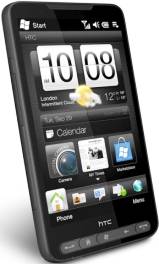
Got a Windows Mobile phone? There's no Windows 7 Phone Series upgrade for you
Could someone please give back Steve Ballmer's brain? He really needs it. The Web is buzzing about a Microsoft executive telling APC Magazine that existing Windows Mobile handsets will not be eligible for Windows Phone 7 Series upgrades. Is Ballmer, Microsoft's CEO, out of his fraking mind for letting this happen? Oh, right, someone took away his brain. Please return it.
What's all the fuss about? Firstly, the no-upgrade policy gives every possible Windows Mobile buyer every reason not to purchase. Secondly, the hottest WinMo phone, the HTC HD2, is suddenly a Windows Phone 7 Series brick. According to Natasha Kwan, Microsoft's Asia-Pacific region Mobile Communications Business GM, the HD2 "doesn't qualify because it doesn't have the three buttons." The smartphone has too much of a good thing--five buttons.
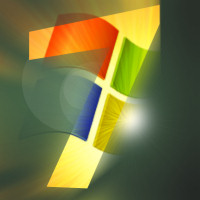
The Windows 7 battery life issue: What's making notebook batteries die?
Since Windows 7's final release last fall, some testers have been reporting that dual-boot network computers seem to consume power more efficiently running Windows XP than Windows 7. One example came last October from JKOnTheRun's Kevin C. Tofel, who saw his own Toshiba notebook battery die 45 minutes sooner running Win7 than Windows XP. But even then, Tofel was skeptical of a few curious facts, including that Toshiba changed its power management utilities.
Since 1999, the system that has reported battery capacity and relative power levels to the operating system has been the Advanced Configuration and Power Interface (ACPI), developed by industry leaders such as Intel, Phoenix Technologies, and Toshiba. But ACPI was developed with the BIOS in mind; and as PC architecture evolves, as even Phoenix will readily concede, the conventional BIOS is becoming an historical remnant. And history has also shown that as a lithium-ion battery degrades, its capability to report its own health degrades with it. Only now have batteries become capable of reporting their capacity -- how much charge they can hold -- as compared to their manufacturers' specifications.
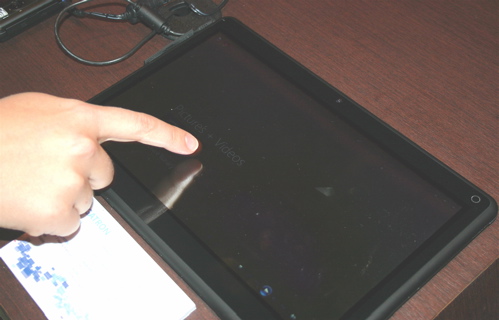
CES 2010: Hands-on with the Atom-based Windows 7 Pegatron slate
During his CES 2010 keynote Wednesday, Microsoft CEO Steve Ballmer spent a little bit of time showing off the slate (or tablet, if you prefer) form factor, and Windows 7's integration with it. In addition to the top secret HP tablet which Microsoft told me was flown in just hours before the event and flown right back out again, Ballmer mentioned other slates with large screens.
One of them is the forthcoming Pegatron Slate, which I had the fortune of spending a good deal of time with this afternoon.

Russinovich: A possible cure for exploitable heap corruption in Windows 7
The key to a huge plurality, if not a majority, of exploits that have plagued Microsoft Windows over the past two decades has been tricking the system into executing data as though it were code. A malicious process can place data into its own heap -- the pile of memory reserved for its use -- that bears the pattern of executable instructions. Then once that process intentionally crashes, it can leave behind a state where the data in that heap is pointed to and then executed, usually without privilege attached.
Yet it doesn't take a malicious user to craft a heap corruption. Multithreaded applications that make use of collective heaps become like multiple users of a single, distributed database. Without intensive methodologies to maintain vigilance, making sure one thread doesn't corrupt an application's heap for all the other threads, the app collapses into something more closely resembling the more colloquial meaning of the metaphor "heap." Microsoft would like to present its development environments and runtime frameworks as providing these vigilance services on behalf of the developer, so she can concentrate on her application. But in recent years, what developers don't know about what's going on under the hood, has come back to bite them.
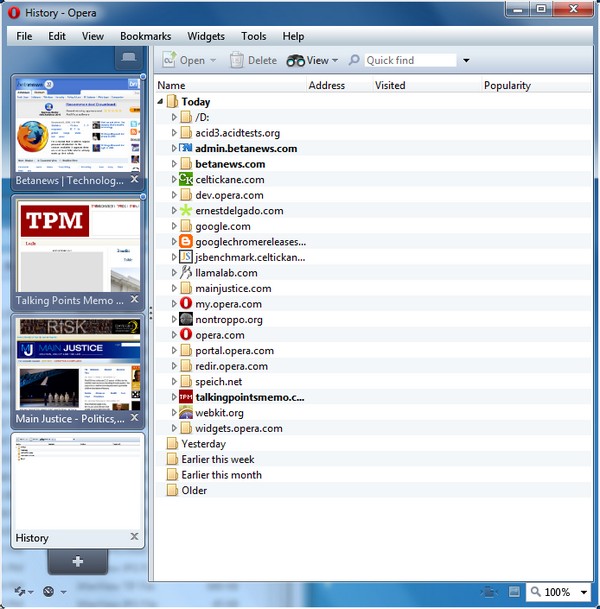
The once and future king: Test build of Opera crushes Chrome on Windows 7
Download Opera 10.5 "Pre-alpha" for Windows from Fileforum now.
How's this for a Christmas miracle: We've been saying that if Opera wants to get back in the game -- if it truly wants to earn a place among the Top 5 positions on Europe's forthcoming "Choice Screen" -- then it has to pick up the pace in the performance department. Apparently while we were writing that, the developers at Opera Software were a little ahead of us on that count.
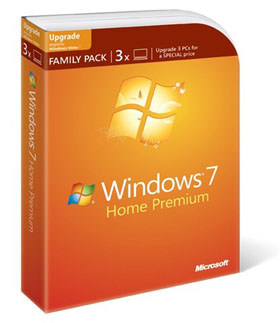
Microsoft: Windows 7 Family Pack wasn't 'pulled,' it just sold out
In response to a Saturday story from Betanews contributor Joe Wilcox, a Microsoft spokesperson told Betanews this afternoon that "the offer has not been 'pulled'" -- specifically, that it did not revoke anything with regard to its three-license Windows 7 Home Premium Family Pack offer. It simply sold out, as Microsoft says its "while supplies last" offer clearly indicated as early as last July.
"The Windows 7 Family Pack was introduced as a limited time offer while supplies last in select geographies," the spokesperson told us. "Response has been very positive and, in some cases, the offer has sold out. Customers interested in upgrading their PCs should purchase Home Premium, Professional, or Ultimate upgrade products."

Microsoft pulls Windows 7 Family Pack, so you can spend more for the holidays
I've got a new spelling for "Scrooge." M-i-c-r-o-s-o-f-t. The company has ended the Windows 7 Family Pack promotion, which is a nice Ba Humbug to you and yours for the holidays. Sure, it could be good for Microsoft's bottom line and perhaps partners' PC sales. But for the masses considering upgrading existing Windows XP/Vista PCs to 7, a good thing is suddenly bad.
Maybe Microsoft executives looked at Apple charging so much for Macs and thought, "Why discount Windows 7?" Perhaps, but generally companies offer greater discounts as the holidays approach, not take them away. Windows 7 Home Premium Family Pack offered three upgrade licenses for the tidy sum of $149.99. Now the upgrade price is $119.99 per license.

My Windows 7 confession (and why you should confess, too)
They say that confession is good for the soul -- or the mind. I'll make mine but insist that you read no further unless you're willing to make yours in comments. Deal?
My confession is the real reason for running Windows 7. In September, I wrote "Why I chose Windows 7 over Snow Leopard (and why you should, too)." In that post, I explained about Windows 7 being my primary operating system since January on two different Sony VAIO notebooks (I see from comments how many Betanews readers remember the Sony rootkit and just love the company for it). As I explained in that post, two primary reasons led to my picking the newer version of Windows over Mac OS X: Windows 7's fresh, new user interface and VAIO Z720 hardware features -- mainly higher-resolution display -- compared to 13-inch MacBook Pro. But neither of these reasons is why I stuck with Windows 7, even for the productivity gains realized from using the operating system over Mac OS X Snow Leopard.
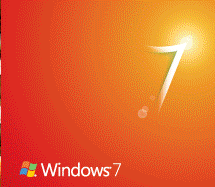
Uh-oh, netbooks -- not Windows 7 -- will lift 2009 PC sales
Gartner is just full of bad news that will suck Windows PC manufacturers' thanks out of American Thanksgiving -- and Christmas along with it. Ho Ho Ho Ba Humbug. Today, the analyst firm predicted that based on fourth-quarter PC shipment estimates, for 2009, the market would grow -- but not because of Windows 7 -- and with deep declines in average selling prices. Combined, the latter two predictions spell lower profits for Windows PC OEMs and potentially overshipment of PCs for holiday 2009.
"We just don't see consumers buying new PCs solely because of Windows 7," Gartner research director George Shiffler said in a statement. "We are expecting a modest bump in fourth-quarter consumer demand as vendors promote new Windows 7-based PCs, but the attraction will be the new PCs, not Windows 7."

PDC 2009: Scuttling huge chunks of Vista architecture for a faster Windows 7
The reason Windows Vista seemed slow, and somehow, strangely seemed even slower over time, is now abundantly clear to Microsoft's architects: The evolution of computer hardware, particularly the CPU, exceeded anyone's expectations at the time of Vista's premiere in early 2007. But the surge in virtualization, coupled with the rise of the multicore era, produced a new reality where suddenly Vista found itself managing systems with more than 64 total cores.
Architects had simply not anticipated that the operating system would be managing this many cores, this soon -- at least, that appears to be the underlying message we're receiving here at PDC 2009 in Los Angeles. As independent scientists were speculating about possible performance drop-offs after 8 cores, server administrators were already seeing it. There were design tradeoffs for Windows Vista -- tradeoffs in efficiencies that could have been obtained through complex methods, for simplicity.

Snow Leopard and Windows 7 still can't crack the netbook problem
Yesterday evening, Apple rolled out the 10.6.2 update to its Snow Leopard operating system, which concentrated mostly on general bug fixes and stability issues as well as some issues in Mail, MobileMe and Safari. In all, there are more than a hundred improvements, and more than 40 security related fixes.
But the big talk today is that this update officially terminates support for Intel's Atom processor family. These low cost, low power processors have become the standard in many nettops, netbooks, MIDs, and ultraportables, and Apple has made a concerted effort to stay out of the way of most of these device categories.

Early sales figures for Windows 7 nicely high, but do we know why?
The initial sales figures for Microsoft Windows 7 after its worldwide launch on October 22 are still being tabulated, but the early estimates sound very promising: According to industry analysis firm NPD, unit sales for Windows 7 software SKUs in the US were 234% higher -- better than triple -- the unit sales for Vista's launch, and US revenue from Win7 software sales was up 82% over Vista's launch.
But as Vista veterans will recall, that launch was botched somewhat, first by a costly delay, then by a decision to launch the product twice (first to businesses in October 2006, then to consumers in January 2007), and then by a lack of participation from partners. And there were still more reasons the Vista launch fizzled, one of which, believe it or not, included the scheduling of the launch on a Tuesday.

Sophos study suggests Windows 7 UAC's default setting is self-defeating
A blog post Tuesday by Sophos senior security engineer Chester Wisniewski stated that recent Sophos tests revealed that User Account Control -- the part of Windows that prompts the user for permission before granting elevated privileges -- was ineffective in stopping common samples of malware from running, in a Windows 7-based system without virus protection.
Whereas two of the ten chosen malware samples for the test would not run in Win7 without UAC turned on at all, only one more sample (a low-prevalence worm code-named W32/Autorun-ATK) was thwarted by UAC. The other seven ran as though they were being blocked only by a stack of dominoes.

Performance drain: The first public perception test of the Windows 7 era
The key selling point for Windows 7, as emphasized in a concerted advertising campaign that stretches across both TV and the Web, is that it's leaner, simpler, and faster. It doesn't have to complete the phrase "faster than..." because we all know how to complete that phrase. Microsoft's bet for Windows 7 is that users smart enough to complete that phrase, care.
So if some of the comments Betanews has been receiving about Internet Explorer's recent problems being a non-event, or a "YAWN," really did reflect reality, then Microsoft has already lost the bet.
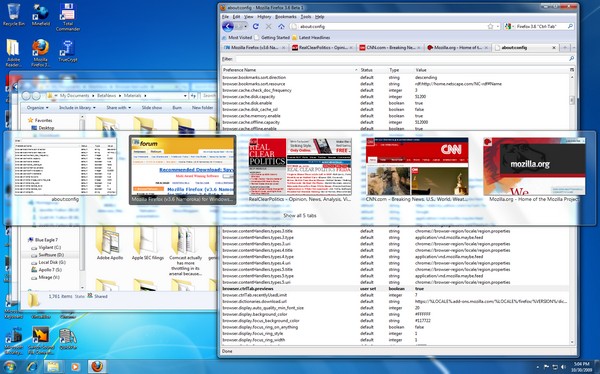
At last! Public Mozilla Firefox 3.6 Beta 1 is live with new Windows 7 support
Download Mozilla Firefox 3.6 Beta 1 from Fileforum now.
One of the nicest new features in Microsoft Windows 7 concerns the revised taskbar, specifically how many more choices are available to you when you right-click an icon, or when you just hover over it to see where all your open windows are. In Mozilla Firefox 3.6 Beta 1, which went live just minutes ago, the browser's integration with the Win7 taskbar is now on a par with that of Internet Explorer 8.
